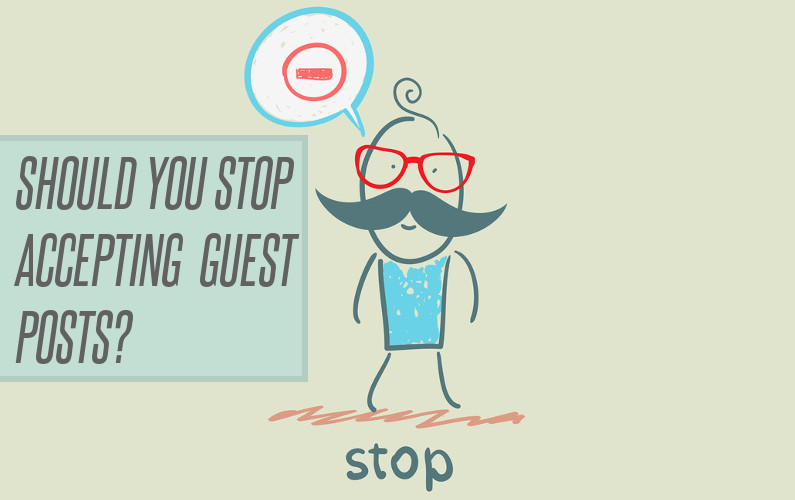The entire internet marketing world was thrown for a loop when Matt Cutts released his video and article, talking about the negative impacts of guest blogging. Some were confused, many completely ignored it, and others just started to freak out. After all, when Matt Cutts starts throwing around phrases like “So stick a fork in it: guest blogging is done”, it’s understandable why bloggers and marketers start to get a little worried.
But I think that among all of the controversy and ruckus all of this caused, people lost sight of the real message Matt was trying to convey.
Sorry, we’re not accepting guest posts anymore
This is the message I recently read on the “submit guest post” page of a popular blog I was interested in writing for. They had accepted guest posts for years, but after Matt Cutts’ message, they were one of the sites that got completely scared off. They even linked to the Matt Cutts article to explain why they’re no longer accepting guest posts.
Their decision is completely understandable since in essence, that’s what Matt Cutts wants. But I don’t think it was really a good move on their part, and I’ll explain why.
Who is Google targeting?
The question blog owners need to ask themselves is why Google is making this move to devalue guest blogging for SEO? When you just look at all of the headlines that say “Guest Blogging is Dead”, it’s pretty misleading. All guest blogging is not dead. And despite how Matt Cutts’ article read, I wouldn’t even go as far as saying it will be ineffective for SEO.
What I took from his message is that low quality, and sometimes irrelevant, guest posting is being devalued. Basically, the people who are sending out shotgun generic email blasts like the one Matt shows in his post are going to get shut down. Because those are generally the people pushing their low quality articles that offer little to no value.
Also, blogs that blindly accept articles regardless of quality are also going to be affected. These types of sites are basically glorified article directories, which Google already devalued a long time ago. If an entire website is filled with guest posts written in broken English, with outbound links to low quality sites, there’s a good chance it will be negatively affected by Google in the near future.
Everyone is not affected
Like I said, Google is trying to eliminate the low quality content that has started to be linked to guest blogging. That’s the whole point of Matt’s article when you really break it down. But all sites that accept content from guest authors will not be affected. How can I say this with such certainty?
Well look at some of the biggest sites online. Lifehacker, Mashable, Wired, and Social Media Today. These sites are filled with content written by guest contributors. Do you really think Google is going to devalue links from these sites? Do you think they’re going to see huge decreases in search traffic? Absolutely not. Matt even states, “I’m also not talking about multi-author blogs”.
The difference between these multi-authored blogs and the blogs Matt is talking about is that sites like Mashable publish quality content. They don’t just post anything that gets submitted to them.
There’s no secret to the decisions that Google makes in regards to changes to their algorithms and who gets penalized. Everything they do is with the goal of putting higher quality content near the top of their search results (after the ads of course because hey, they gotta get paid). Sure it doesn’t always work out like that, but that’s ultimately what they’re trying to achieve.
When you look at all of their big changes such as punishing sites with duplicate content, devaluing low quality article directory links, or even placing more value on in depth articles, they all have one thing in common- they reward quality and punish garbage.
What should blogs do from now on?
Set standards for what content you’re willing to publish. And have rules in place for what type of anchor text can be used. This makes it harder for spammers to fill your site up with low quality posts that don’t offer any type of value to your readers.
Another great thing you can do is require guest contributors to sign up for your site to publish articles like Social Media Today does. That way, your site becomes more of a multi-author blog (which Matt says is fine) than a pool of crappy guest posts that could devalue your site.
You should also make use of Google authorship. Anyone who guest posts on your blog should have a Google+ profile and list your blog in their “contributes to” list in their profile. All of this is easy if you use WordPress. What adding authorship does is weed out some of the potential spammers, and also shows Google that your website and guest posts are legitimate.
If your site is really high value, and you want to be more selective about who can guest post for you, then you can go the ProBlogger route and stop taking unsolicited guest posts entirely. Instead, actively search for people who you want to guest post for you. This is particularly effective for sites with an active following and are highly sought after for guest blogging.
What should bloggers do from now on?
Bloggers are probably going to be more affected than the actual blogs. Bloggers can write their own content, pay a ghostwriter, or use other means for getting content on their site. They don’t necessarily need guest bloggers. For bloggers, it’s going to become more difficult to get your articles published. There’s no doubt in my mind that more blogs are going to stop accepting guest posts entirely. But that doesn’t mean that it’s going to be impossible.
The first thing you should do (hopefully you started doing this a long time ago) is to stop sending those annoying, generic, mass emails offering guest posts. Blog owners don’t like them. Each email you send to a blog owner should be personalized and specific to that blog. If you have no clue on how to properly ask for guest posts, check out Ann Smarty’s eBook.
Secondly, stop sending out garbage content. That low quality article you’re sending out not only affects you, but it stops blogs from wanting to accept guest posts from anyone at all, which ruins it for everyone. Start writing higher quality content that is worthy of being published. Low quality guest posts are what caused this whole mess in the first place. Focus on writing great content, and you’ll have a much better chance at getting your posts published.
Sign up for guest blogging groups. Sites like My Blog Guest and Blogger LinkUp are filled with bloggers that are actively looking for people to publish content on their site. There are also communities on Google+ as well for guest bloggers. Pretty soon, unsolicited guest posts will be a complete thing of the past. So the focus will be on:
- Building relationships and networking with blog owners
- Finding blogs that are actively looking for guest contributors
Guest Blogging isn’t dead
To wrap this whole thing up, I’ll just say this– guest blogging is not dead. What is dead, is old practices that bloggers and marketers have been using for years that lead to low quality content infecting the internet.



